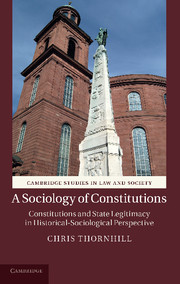 A Sociology of Constitutions
A Sociology of Constitutions Book contents
- Frontmatter
- Contents
- Acknowledgements
- A note on texts and translations
- Introduction
- 1 Medieval constitutions
- 2 Constitutions and early modernity
- 3 States, rights and the revolutionary form of power
- 4 Constitutions from empire to fascism
- 5 Constitutions and democratic transitions
- Conclusion
- Bibliography
- Index
1 - Medieval constitutions
Published online by Cambridge University Press: 07 September 2011
- Frontmatter
- Contents
- Acknowledgements
- A note on texts and translations
- Introduction
- 1 Medieval constitutions
- 2 Constitutions and early modernity
- 3 States, rights and the revolutionary form of power
- 4 Constitutions from empire to fascism
- 5 Constitutions and democratic transitions
- Conclusion
- Bibliography
- Index
Summary
The social origins of modern constitutions
The earliest modern constitutional arrangements can be identified in different European societies in the high medieval period: that is, in the later part of the twelfth century and throughout the thirteenth century. In this period, most European societies were beginning gradually to move away from the highly diffuse social order of early feudalism, which had itself supplanted the more vertical political structures of the Carolingian period, and the more advanced societies of this time witnessed a substantially increasing centralization of their political institutions and a growth in the inner consistency of their legal apparatus. This does not imply that the highly localized jurisdictional structures based in lordship, lateral association and private force that characterized earlier feudalism had dissolved by the twelfth century. In fact, a recent outstanding monograph has persuasively demonstrated the contrary (Bisson 2009). However, by the later twelfth century many European societies were beginning to develop more regularly constructed legal and political systems, and they were in the process of devising at least the bare practical and conceptual instruments to make this possible. The transition from early to high feudalism was thus marked by a deep societal impetus towards more formal legal administration: this ultimately shaped the constitutional design of emergent centres of political power.
- Type
- Chapter
- Information
- A Sociology of ConstitutionsConstitutions and State Legitimacy in Historical-Sociological Perspective, pp. 20 - 76Publisher: Cambridge University PressPrint publication year: 2011
